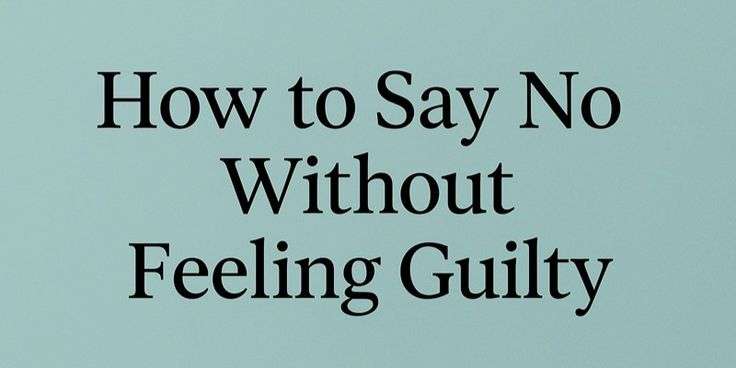8 Polite and Powerful ways to say NO without any Guilt
The capacity to say no—clearly, firmly, and guilt-free—is one of the most underappreciated abilities in both the personal and professional spheres. People all too frequently overcommit to activities, occasions, or demands that they lack the time, motivation, or desire to complete. This propensity results from a fear of confrontation, anxiety about failing others, or a desire to keep positive connections.

The reality is that if you accept anything that doesn’t fit with your priorities, you are automatically turning down something that is important to you, such as your job, your family, your health, or your mental well-being. Being able to say no politely is a sign of self-respect and boundary setting, not selfishness.
Here are eight tactful and kind ways to turn down requests. The clear, guilt-free, and courteous nature of each sentence guarantees that you uphold your limits without endangering relationships.
1. “Thank you for asking, but at this time, I am unable to commit.”
This expression expresses thankfulness while acknowledging that you already have a busy schedule. It’s ideal when a buddy invites you to something you can’t really go or when a coworker asks you to join another project.
Example (Workplace): You are asked to co-lead a committee by a colleague.
"Thank you very much for considering me, but at this time, I am unable to commit. I want to put my all into the projects I currently have on my plate.Why it works: It accepts the offer, refrains from giving too much information, and stops further pressure.
2. “I hope you understand, but that doesn’t work for me.”
This courteous rejection conveys a clear message that there is no opportunity for compromise. It’s particularly helpful when the request goes against your comfort level, availability, or values.
Example (Social): When you need to relax, a friend recommends going out on a weeknight:
For me, that doesn't work. I hope you get that. Let's schedule something for when I can be more available.Why it works: It’s tough yet kind, eschewing justifications and refocusing attention on upholding goodwill.
3. “I appreciate your consideration, but I must pass.”
A succinct, polite way to say no—perfect for informal requests for favors or invites. It establishes a distinct barrier while preserving warmth.
Example (Professional Networking): During a hectic quarter, you receive an invitation to present at a panel.
"I appreciate your consideration, but I must pass this time. Please remember me for any upcoming openings.Why it works: It expresses gratitude and maintains the possibility of future cooperation.
4. “At this time, I have other priorities.”
This serves as a potent reminder to yourself and other people that time is of the essence. It’s a polite and honest approach to turn down requests without feeling the need to provide further justification.
Example (Workplace): Your supervisor requests that you take on a report that is outside the purview of your position.
"I would like to assist, but right now I have other priorities that require all of my focus."Why it functions: It emphasizes your dedication to your current obligations while outlining clear expectations.
5. “I wish you the best, but I’m not the right person for this.”
Sometimes a request just doesn’t fit your interests or areas of experience. This expression politely reroutes without abandoning the other individual.
Example (Social): You are asked to assist a neighbor with a very technical task that you are not very knowledgeable about.
"I hope you find the right support, but I'm not the right person for this."Why it works: It keeps you from going overboard while yet being kind.
6. “Saying no is preferable to saying yes and then disappointing you.”
This expression exhibits honesty and vision. It’s helpful when you wish to stay away from deceptive claims.
Example of Freelance/Client Work: A prospective customer requests a speedy completion of a challenging project:
Saying no is preferable to saying yes and then disappointing you. I do not wish to sacrifice quality.Why it works: It puts integrity and dependability ahead of temporary concessions.
7. “I don’t feel comfortable with that.”
When demands force you into situations that don’t fit with your principles, comfort level, or professional ethics, this term is crucial for setting boundaries.
Example (Social): A buddy proposes an unfair cost-sharing arrangement:
"I would be happy to talk about a more equitable option, but I'm not comfortable with that."Why it works: It shows how comfortable you are without being defensive or apologetic.
8. “At this time, I must respect my boundaries.”
When handling repeated demands or emotionally taxing circumstances, this is a very self-respecting approach to say no.
Example (Personal Life): A relative requests more time or effort than you are able to provide:
"In order to concentrate on my own well-being, I must respect my boundaries at this time."Why it works: It minimizes guilt by framing boundaries as unavoidable but based on self-care.
Why It’s Important to Say No
Saying no is about deciding where your “yes” really belongs, not merely about declining a request. You create space for possibilities that align with your objectives each time you turn down something that doesn’t.
Think about this: you run the danger of exhaustion and resentment if you consistently accept more work, social events, or duties. On the other hand, you may save energy for important relationships, self-care, and initiatives by engaging in conscious refusals.
Social Examples of Appropriate Refusal
At work: You are asked to remain late on a project by a team member. Saying “I’d love to help, but I need to leave on time today” is an alternative to feeling compelled. Let’s figure out how else I can help during business hours.
Among Friends: Try saying, “Thank you for the invitation, but I must decline this time,” if you are asked to go on a trip that you cannot afford. I hope everyone had a fantastic trip!
In family life, a relative asks for money that you are unable to give. “I wish I could, but I need to respect my boundaries at this time,” is the appropriate response. I hope you get the help you require.
Saying no without feeling guilty is about respecting yourself, not about rejecting others. You can respectfully, professionally, and forcefully refuse using any one of these eight sentences. You’ll discover over time that establishing limits enhances your relationships in addition to saving your energy. Honesty and clarity are valued more by people than hesitant yeses that are followed by disappointment.
The next time you’re feeling conflicted, keep in mind that saying no politely now is preferable to regretting it later.



